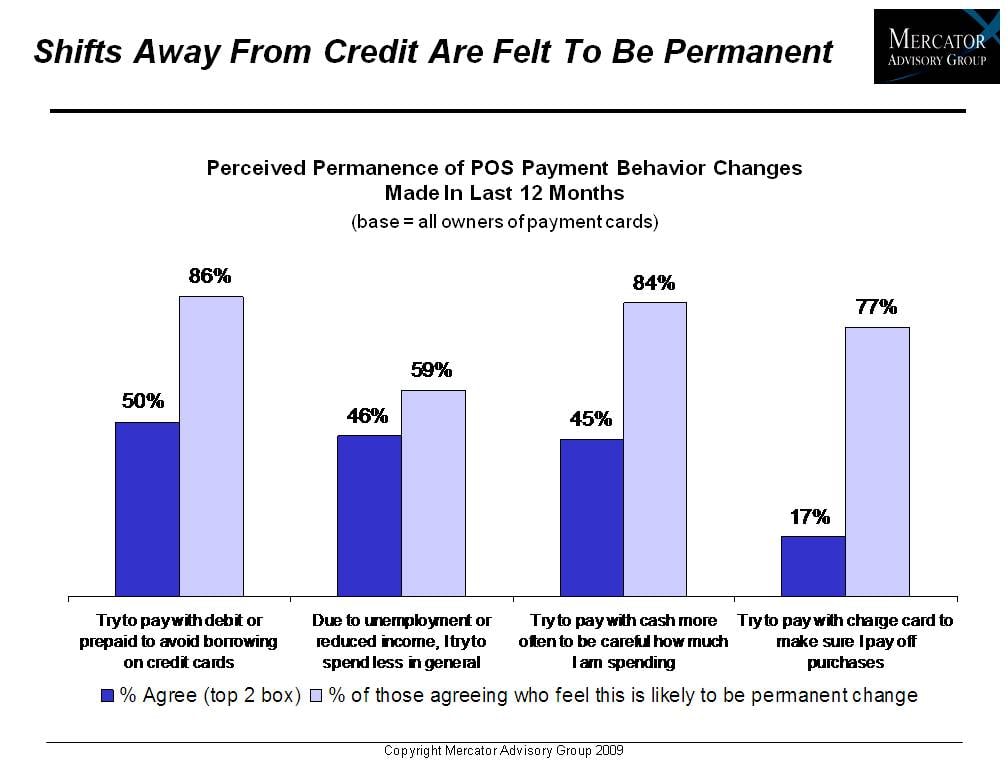2009 - CPS - Issue #1 - CrossTabs - Credit
- Date:July 30, 2009
- Author(s):
- Mercator Research
- Research Topic(s):
- North American PaymentsInsights
- PAID CONTENT
Overview
This is for the Consumer Credit CrossTab Report.
New Consumer Research Examines Credit Card Usage and Future Impact on the Credit Card Industry
Third of Four Reports from Mercator Advisory Group's
Primary Data Series
Boston, MA - July 30, 2009 -- The broad effects of today's economic environment and how people feel about the utilization of credit could represent the beginning of a new, different, and persistent credit card issuing environment. Consumers have been modestly affected by reduced access to credit on their credit cards, but have nonetheless taken broader actions to reduce their credit card usage.
In the midst of payment card networks and issuers releasing quarterly earnings, Mercator Advisory Group has released data focused on consumer behaviors and opinions as a leading indicator for shifts in consumer payment product demand. Mercator Advisory Group's newest report The Consumers and Their Credit Cards: A Cooling Relationship Threatens Post-Recession Outlook explores changing consumer attitudes and behaviors with regard to credit cards. This report is the first in a series of four topical consumer survey reports to be released by Mercator that examine payment card and banking topics.
The report is based on survey questions that examine the direct impact of cardholders' reduced access to card-based credit including reduced credit lines, denied applications, and spending reductions attributed to reduced credit. Also examined is changing tender preferences driven by changes in household finances and credit.
Explored in the report are critical concerns for issuers and other stakeholders as they seek to make sound business decisions that enable them to identify existing opportunities and develop strategies around an economic recovery. Every environmental challenge presents opportunities, and Mercator Advisory Group highlights these. In particular, there may be some real cardholder loyalty benefits for issuers who serve their current cardholders well during these difficult times.
Highlights of the report include the following:
- In today's recessionary environment, declining access to card-based credit is widespread, but not all actions are negative. Of the 27% of respondents noting they applied for new credit cards, about 6 in 10 were successful.
- Among those who experienced an adverse outcome (line reduction, involuntary account closure, denied application), a net 15% of all respondents indicate they delayed or cancelled purchases (including vacations, major purchases, daily essentials, or small business purchases) due to reduced credit access.
- Nearly two thirds of respondents can be classified as "payment changers," indicating they have taken specific actions to reduce credit card use, including purchases shifting to debit, prepaid and charge cards or cash.
Women are more likely than men to make changes in payment card use. - When consumers take actions to reduce credit card use, a vast majority indicate those specific actions are likely to be permanent, lasting beyond the recession.
"Credit card issuers may have an opportunity to leverage consumer loyalty to existing card relationships that carry them through the recession. With this survey fielded at what might turn out to be the nadir of consumer sentiment in the recession, cardholders may be feeling empowered by turning away from credit and saying they will do so permanently. Future behavior could definitely depart from consumer expectations, but as a referendum on the appeal of credit cards today, the consumer point of view is certainly bearish." Ken Paterson, VP for Research Operations at Mercator Advisory Group and the author of the report comments. "This makes understanding consumer sentiment and behavior critical to card issuers and other stakeholders, as they seek opportunities today and plan for growth when the economy improves."
One of the 14 Exhibits included in this report

The report is 33 pages long and contains 14 exhibits and is based on a national sample of 1,012 online consumer panel survey responses completed between May 28 and June 4, 2009.
Subscribers to the Mercator Primary Data Series will receive three additional topic reports from this survey. These will focus on consumer usage and purchase behavior with regard to prepaid cards, consumer perceptions of payment card security and potential to use mobile devices for payments, and consumer perceptions of banking and card loyalty programs.
Please visit us online at www.mercatoradvisorygroup.com.
For more information and media inquiries, please call Mercator Advisory Group's main line: 781-419-1700 or send email to [email protected].
Mercator Advisory Group is the leading independent research and advisory services firm exclusively focused on the payments and banking industries. We deliver pragmatic and timely research and advice designed to help our clients uncover the most lucrative opportunities to maximize revenue growth and contain costs. Our clients range from the world's largest payment issuers, acquirers, processors, merchants and associations to leading technology providers and investors.
Book a Meeting with the Author
Related content
A Generational Look at Card Network Usage
In this Primary Data Snapshot by Javelin Strategy & Research, a dive into year-over-year usage of the four major U.S. credit card networks shows that generationally targeted approa...
The Bots are Coming: Generational Aspects to AI Adoption
This Primary Data Snapshot—a Javelin Strategy & Research report focusing on consumer payment usage and behavior—shows how consumers, particularly younger ones, are leveraging the p...
2025 North American PaymentInsights: U.S.: Financial Services and Emerging Technologies Exhibit
This report is based on Javelin Strategy’s North American PaymentsInsights series’ annual survey. A web-based survey was fielded between July 14 – 26, 2025, using a US online consu...
Make informed decisions in a digital financial world